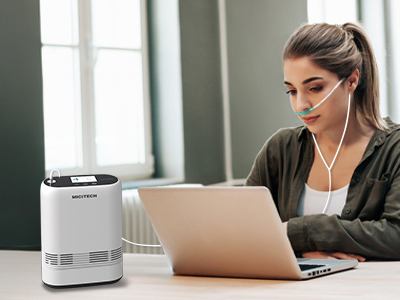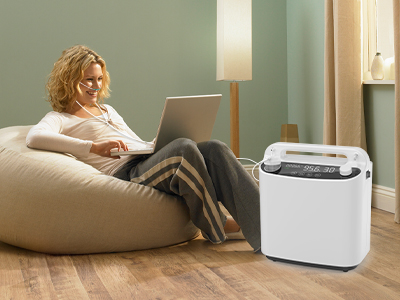11 Mar 2024
Oxygen concentrators are medical equipment that extract oxygen from the air and deliver it to individuals who require supplemental oxygen therapy.
Portable oxygen solutions, such as battery-powered concentrators, offer flexibility and mobility for individuals who need oxygen therapy outside of their homes.

Understanding Battery Operation
A. Battery-Powered Oxygen Concentrators
Battery-powered oxygen concentrators are designed to operate using rechargeable batteries, allowing users to receive oxygen therapy even when they are not near a power outlet.
B. Types of Batteries Used
These concentrators typically use lithium-ion batteries due to their high energy density, lightweight design, and long-lasting performance.
Advantages of Battery-Powered Oxygen Concentrators
A. Portability and Mobility
Battery-powered concentrators enable users to move freely without being tethered to a power source, making them ideal for travel and outdoor activities.
B. Independence from Power Outlets
With a battery-powered concentrator, individuals can maintain their oxygen therapy regimen even during power outages or situations where access to electricity is limited.
Battery Life and Capacity
A. Factors Affecting Battery Life
Battery life can vary depending on factors such as flow rate settings, usage patterns, and environmental conditions.
B. Optimal Battery Management Practices
Proper battery management, including regular charging and maintenance, can help extend the lifespan and performance of the batteries.

Limitations and Considerations
A. Battery Recharge Time
While battery-powered concentrators offer portability, users need to consider the recharge time required to ensure uninterrupted oxygen therapy.
B. Backup Power Options
It's essential to have backup power options available, such as spare batteries or alternative oxygen sources, in case of battery failure or depletion.
Applications and Use Cases
A. Traveling with a Battery-Powered Concentrator
Battery-powered concentrators are well-suited for air travel and other forms of transportation, providing users with the freedom to travel without relying on supplemental oxygen tanks.
B. Emergency Situations and Power Outages
In emergency situations or power outages, battery-powered concentrators can serve as a reliable source of oxygen therapy, ensuring continuity of care for individuals with respiratory conditions.
Choosing the Right Battery-Powered Concentrator
A. Assessing Battery Life Requirements
When selecting a battery-powered concentrator, users should consider their daily oxygen needs and choose a device with sufficient battery capacity to meet those requirements.
B. Comparing Features and Specifications
Users should compare the features, specifications, and battery performance of different concentrator models to find the one that best suits their lifestyle and oxygen therapy needs.
Conclusion
A. Benefits of Battery-Powered Oxygen Concentrators
Battery-powered oxygen concentrators offer significant benefits in terms of portability, independence, and reliability, allowing individuals to maintain their oxygen therapy regimen wherever they go.
B. Enhancing Mobility and Quality of Life
By providing users with the freedom to move and travel without the constraints of traditional oxygen delivery systems, battery-powered concentrators can significantly enhance their mobility and quality of life.
Keywords: oxygen concentrator
Originally published 11 Mar 2024, updated 11 Mar 2024.